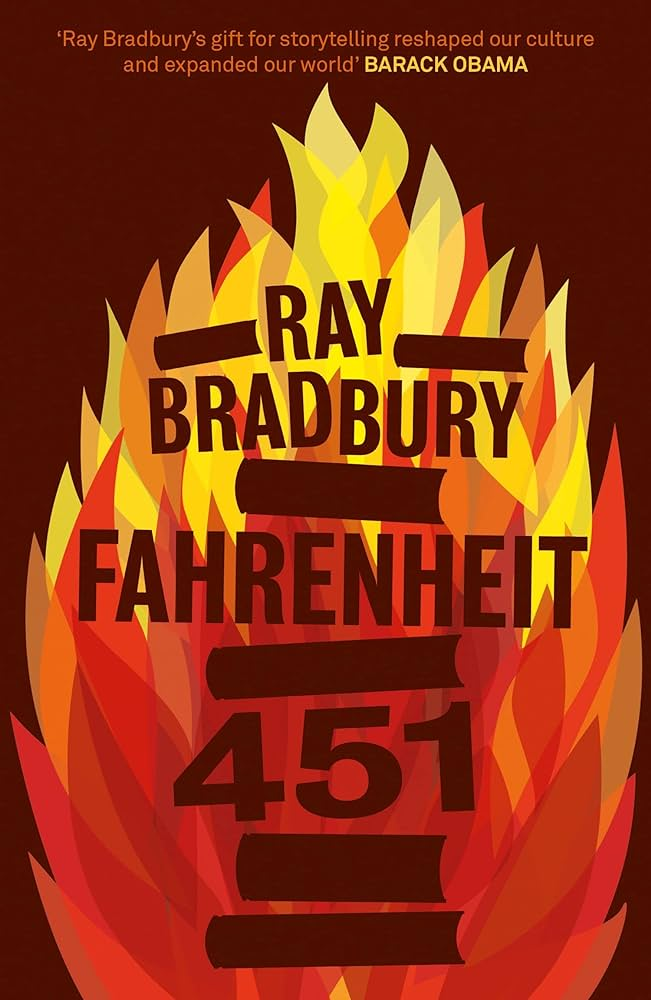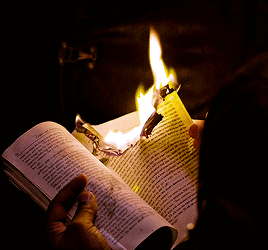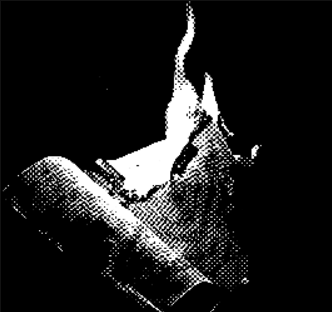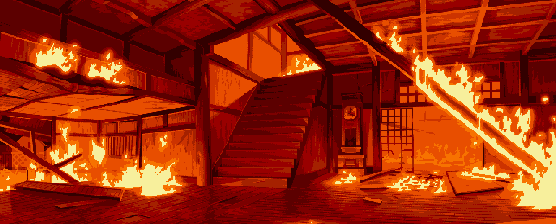
Fahrenheit 451 Ray Bradbury
9 Libraries of Alexandria out of 10.










Get rid of screen clutter?
Fahrenheit 451 by Ray Bradbury is a dystopian, science-fiction novel that depicts a society where information is easily digestible. Most notably, books are banned and deemed as societal taboo. Any heretics found are reported to “firefighters”, professionals equipped with flamethrowers who burn everything which the book has claimed influence over. Libraries, houses, people. Bradbury exemplifies how a world lacking the heart of creation can create soulless people.
SUMMARY
Guy Montag is a firefighter. Fahrenheit 451 awakens in the distant future with Montag returning from a mission. He discovers his wife has overdosed on sleeping medication as he laments on the situation wistfully. She is brought back however returns to her self-destructive tendencies. One night he meets a young girl, Clarisse. She talks of things, real things, that make Montag think for himself rather than being influenced by the things around him. There is a certain spark about her which ignites something new in Montag. In such a society, Clarisse is an outlier. She is never seen again.
The beating drum of war looms in the background.
A few days later, Montag is sent to burn down a library. However the owner stands her ground and refuses to leave. She lights a match as she burns herself and her books alight. This experience changes Montag forever, for what information could books hold that they would be worth sacrificing your life over? What foul rituals and incantations belong in books that died with her? In the midst of the flames he pockets a copy of the Bible. Coming home, he hides it fearfully, believing the “Mechanical Hound”, a robotic authority, is looming outside.
That very morning, the captain of Montag’s fire-station, Beatty, appears at Montag’s door and delivers a speech about the nature of books and literature. The meaning of the parlour, television and society. How attention spans grew shorter so the media acclimated. Television grew simple whilst books carried ideas which required more time to digest. Complex ideas which would develop into hateful thoughts, thoughts of free will and self-expression. Books were banned to keep people’s heads out of their own minds. And so Montag was a firefighter, maintaining the peace. Beatty leaves with a warning, any firefighter who happens to have a book and doesn’t burn it, the other firemen come and do it for them.
Beatty leaves as Montag reveals to Mildred the collection of books he has stolen from his job over the years, cached away in a vent in the ceiling. Montag asks her to hear him out, saying that she would just have to trust him. Mildred stands defiant still.
Heavy helicopters drone through the air as the war rages on in the background. Muted, but not diminished.
Thus concludes the first third of the book.
Montag thinks back to Clarisse and remembers another man like her, Faber, an old English professor he met back in the park. Their conversation brief however remained that same spark in the air that there was with Clarisse. He meets Faber at his house with the copy of the Bible from earlier. If anyone could understand, it would be him. The two hit it off well and Faber reveals to tell him about books, given that he will follow his plan. He gives Montag a makeshift two-way radio to fit in his ear.
He arrives back at his house with Mildred only for there to be a party with her and two other women. They talk frivolously and watch the parlour, a giant tv screen, however after Montag’s advances in conversation go nowhere, he soon grows frustrated and forces them to listen to poetry. Hearing the blasphemy of literature, the two women leave in tears. Not soon after he is called to the fire station by Captain Beatty. Smugly, he drives the firefighters to the dispatch. They have arrived at Montag’s house.
Thus concludes chapter 2.
Beatty berates Montag to burn down his house. He dares him. Challenges. Montag begins to pour the flame through the flamethrower as Mildred runs out of the house. Beatty encourages him further as he notices his earpiece and picks it out. Beatty taunts him that as soon as Montag’s done, he’ll go after Faber next. Montag burns him alive. He runs away as the Hound chases after him. It manages to inject his thigh before it is nothing more than melted scrap. He hobbles into the alley and hides away in the dark.
He limps to Faber’s house. There, Faber reveals a secret enclave of literates hidden on the outskirts of the city and urges Montag to go meet them. On the way there he stops to peer inside a house only to see helicopters overhead screening his whole getaway chase. With no other option, Montag runs for the river and changes into Faber’s clothes in order for the Hound to lose his scent. It works. He meets the book-lovers further downstream as they denote themselves as books. They are able to remember whole books and chapters, their minds like libraries.
They tell of how there are many like them all across the country as Montag finds comfort for the first time. The city and all its problems seem so far away from him now, and then, in a glance, it is reduced to rubble. The planes of war fly overhead as they continue to drop bombs. The war concludes the very same day it started, the group stand amidst the chaos and picture how they will rebuild it.
ENTRY
Fahrenheit 451 was a marvellous text for me and is something which I enjoyed reading deeply. I only wish that the book’s ideas didn’t come with the caveat of its brevity. I chose this text specifically because its central notion is the banning of books and how that impacts society. Immediately I was hit with the sense of Bradbury’s unique writing style which he took for this book as it is quick and concepts are thrown at you in a fraction of a second. There are almost no breaks as paragraphs follow each other one after another. Conversation is vapid and sparse yet sometimes it can provide the most thought-provoking insight into characters’ minds. Despite this there was never one moment where I thought that Bradbury had made a logical step. Almost all the characters are compelling, especially Beatty and his antagonism, besides Mildred which he has purposefully made not. Reading the book brang with it a weird comfort, it was a breath of fresh air to read a book about books and their place in the world. Both dialogue and Montag’s own internal thoughts provide clear definitions in how a world without books behaves and thinks. The writing reflects this more so than anything else I have read. Every little feature the authour has meticulously detailed whilst still preserving the mysterious element embedded in science fiction. Initially the writing was a curveball but I quickly grew to like it.
My favourite section of the entire book was Beatty’s speech when Montag was sick and it’s not even close. There is something vindictive and insubordinate against all of the city’s rules as you watch Beatty monologue eloquently, nothing like anything else you have read in the book. It extends itself for over 5 pages and not a step of it seems out of beat. Beatty is the captain of the firefighters and yet here he is speaking in prose and applying metaphors like no one else. It’s completely chilling. Beatty talks about Clarrise, society and the nature of books; running circles around Montag. My personal favourite of the speech is “You ask Why to a lot of things and you wind up very unhappy indeed, if you keep at it. [Clarisse] is better off dead.” “Yes, dead.”” The way Montag is almost forced to reply “Yes, dead.” reveals the complexion behind Beatty’s character. Beatty has complete control over the situation, he could simply choose to burn Montag’s house down at any moment but he purposefully chooses not to. He already knows of the books he’s stashed. However he is not justice, simply its administrator. He simply does it for the upper hand, to manipulate Montag quite possibly for his own enjoyment. There are hints in how Beatty knows all the things he knows because he has read the books himself. He has gotten that “itch” before. There is simply something so enticing about a character which knows a way to uproot someone from anything they’ve ever known with just their words. Someone who has nothing to lose, who plays with their hand face up. Montag was peering into the flame to read the words and Beatty was simply waiting on the other side. There is a character like Beatty in almost every Ray Bradbury text and I find it satisfying every time.
Juxtaposed to the golden goose that is Beatty, I find Montag’s wife rather quite boring. Mildred is a character who is supposed to be portrayed as the sad result of society. Ignorant and unaware to a majority of her surroundings, Mildred and her relationship with Montag is lacklustre. She is glued to the screen that are the parlour walls, a screen on each wall of their house. She is portrayed as the average citizen in the city, the bleak culmination of all the government’s censorship and control. The book starts with her blissfully overdosing on pills as Montag arrives at home. He calls for a doctor to “suck out the bad blood.” The following morning she refuses to discuss her overdose and would rather listen to her “seashell” (a radio that fits in the ear). Whether Mildred is even aware of her relationship with Montag at all is never made clear, they barely have any moments of loving indulgence as Mildred spends the day laughing at the “white clowns” and her “family” on the parlour screen. When asked whether she remembers where she and Montag met she can’t remember and almost immediately changes the subject back to her technology. It’s borderline parasitic. Whether she has a choice in being blissfully ignorant is one of the only interesting aspects of her character. Whether the overdose that night was on purpose or because she simply couldn’t take the bore of the world. The sameness, the similarities. Then she runs away and is never seen again. I understand why Bradbury needed her as a necessary Juxtaposition to Montag’s curiosity, however she could still be developed further if the text was longer. Her self-destructive nature, her overdose and finding enjoyment carelessly speeding down streets, alludes to something more under the surface which Bradbury never builds up on. Why Montag decides to think of her at all after the nuke is one of life’s biggest mysteries.
However the moment where Montag finally rejects the world and burns Beatty alive was such a thrilling twist and I was all for it. I wish that that moment would have been the ending of the book rather than the one we actually got. The nuclear story about the war droning on in the background and none of the characters being the wiser to move out of the active warzone because they are too awestruck by the next flashing lights on their screens. It must be similar to a car crash, seeing the disaster unfold around you but being unable to avert your eyes, unable to look away from the fire until it consumes you. Just like Montag. The way the plot developed was enjoyable however I thought the scenes when Montag goes back to his seemingly normal childhood in between these high-tense moments ruined the emotional sentiment behind them. If his childhood seemed so normal then what happened? However the tapestry of a plot which the authour weaved unfurled into a story of high stakes and genuinely an interesting read.
Even if you aren’t a fan of dystopias I would highly recommend it just due to all the ideas it tackles. All of the houses are the same, the streets seem to repeat endlessly as all the cars drive in picturesque rows. Bradbury’s expression of the far future manifests itself as both his own fears for the newer generations combined with the place books had in his life. This is why the true reason why books are censored is never truly revealed, merely hinted at, censorship and the idea of free-thinking has been prohibited by the government itself. The idea came to Bradbury when he was stopped by a police officer for merely walking on the street, an idea which represents itself through this all-consuming government oriented media. This text is one of the most obvious where you can tell that the authour’s own views inspire the text itself. It is why Montag and Faber are presented as free-thinking heroes whilst Beatty is the antagonistic villain, imposing under the guise of what is right and wrong. However I don’t think it is as black and white as that. Even if Montag did what he thought was right, he still murdered Beatty and gets away with it. At the end, the Hound catches some stranger on the streets if only to fulfil the satisfaction of the audience. The government knows that they cannot have a conclusion where the killer isn’t caught as it would lead to distrust and eventual free-thought. There must always be an ending for what better book is there then one left unread?
Fire being correlated with destruction is prevalent throughout the entirety of the text however I found the metaphor of the phoenix being able to rise out of the ashes an infinite amount of times. It's a symbol for the cycle of the society, perhaps the original city started out being made from another group of outcasts, only moulded and distorted until this cookie-cut city was all that remained. It also represents the intangibility of ideas; for you can burn the book, but you can’t kill the idea within it. They will always rise again. Another pattern embedded in the book was Montag’s mannerism of counting. Montag seems to almost do it without noticing, a symbol of the power which the society has on him as he resorts to something tedious and mind-numbing. It could be said that numbers are the opposite of literature, they are definite and objective whilst books open up the mind to opportunities and thoughts.
This book has a way of giving brief notices to changes in the plot, and for that reason, there is almost no way to predict anything which is going to happen. Clarisse is an interesting character for the first 30 pages of the book then she is never seen again. Montag begins to share his books then he has to burn his house down. Faber has this grand plan and then Montag has to steal his clothes and alcohol to run from a mechanical hound. The city is there and then it's not. It’s jarring but in a way which fits the world-building present in the book already. Televisions in Fahrenheit 451 are brief and simple so it's only fitting that the antithesis, a book, is complex with tortuous twists and turns. It's brilliant.
Overall, this book goes to highlight how the banning of literature only strengthens it, which is why it is so ironic that this book has been banned before due to its interpretation of violence and negative outlook to religion. Above all else, Bradbury speaks for freedom and challenges the suppression of information and where it leads. Without freedom of information the individual is shackled. The authour highlights how listening to the mindless hum of conformity leads only to mindless people. It is present in Mildred, her friends, the parlour, “family” and the city itself. This is only reinforced through how the characters use violence as a form of entertainment, barbarian, yes, but also one of the only forms of escape from the dull drone. With this in mind, the war could be interpreted as the utmost resolution. The absolute zero. As the only way for a phoenix to be reborn from the ashes is if it is burned down first.




